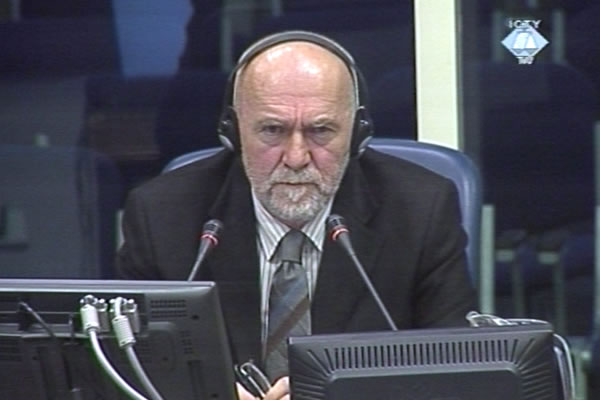Home
WHEN LITTLE KIDS PLAY WAR…
Ante Gotovina’s defence witness Stjepan Sterc was shown minutes from the meetings of the Croatian leadership after Operation Storm where Tudjman and other high-ranking officials discuss ways to prevent Serbs from returning to Krajina and to settle Croats in their houses. Sterc said that that the project had never been implemented in practice. According to Sterc, the discussions at those meeting looked like ‘little kids playing war’
 Stjepan Šterc, svjedok odbrane Ante Gotovine
Stjepan Šterc, svjedok odbrane Ante Gotovine In the cross-examination of former Croatian assistant minister of restoration and development, prosecutor Gustafson challenged his claim that a number of steps had been taken to facilitate the return of the Serbs who had fled Krajina after Operation Storm in the summer of 1995. The prosecution contends that the Croatian leadership headed by president Tudjman did everything it could to make sure Serbs would not return. Sterc is testifying as Ante Gotovina’s defense witness. Together with generals Cermak and Markac, Gotovina is charged with taking part in a joint criminal enterprise aimed at the permanent removal of Serbs from Krajina.
The prosecution confronted the witness with the minutes from a number of meetings in 1995 and 1996 when the highest-ranking state officials debated the ways how to prevent the Serbs from returning to Krajina, yet at the same time creating a false impression that there was good will to accommodate those who wanted to come back. Thus, according to the minutes of a meeting of the state leadership of 30 August 1995, President Tudjman was against issuing visas to 204 potential Serb returnees who were waiting in front of the Croatian embassy in Belgrade. ‘If we allow those 204 to return, tomorrow there will be 1,204 of them and in ten days 12,000. For the time being, no way’, Croatia’s leader was adamant.
Some time later, at a meeting on 25 October 1995, Tudjman said that he wouldn’t mind ‘if 3,000 out of 300,000 Serb refugees returned’. Tudjman’s associates, including the current Croatian prime minister Jadranka Kosor, advised Tudjman to allow a small number of the so-called humanitarian returns of the old and the ill as it could also serve as eyewash for the international community. Sterc said that he didn’t attend those meetings; all he could confirm was that nobody ever ordered him, as the person in charge of refugees, to prevent them from returning.
According to the prosecution, Croatia’s intention was to seize the houses belonging to the Serbs who had fled and to use them to accommodate Croats. That is why a law was passed to confiscate the property of those who failed to come back within 90 days. The other measure, the prosecution argues, was buying out the refugees through the state-run Real Estate Trading Agency. The prosecution today showed transcripts of several speeches Jure Radic, development and restoration minister, made at the meetings of the state leadership in 1995 and 1996, where Radic said that Serbs were ‘the most corrupt nation in the world’ and that’s why they had to be offered an opportunity to sell their property. At the same time Radic presented to Tudjman a detailed plan to move Croats into Serb houses; he called it ‘the colonization of the liberated territory’. Sterc, who was Radic’s assistant at the time, replied that nothing of the sort happened in practice, adding that the conversations of high-ranking Croatian politicians looked to him like ‘little kids playing war’. The law on the confiscation of property applied to all the Croatian citizens in the liberated territory, not only the Serbs, Sterc added.
The trial for crimes during and after Operation Storm continues on Tuesday. Next week Gotovina’s defense will call its military expert, British general Timothy Cross, to give evidence.
Linked Reports
- Case : Gotovina et al. - "Operation Storm"
- 2009-07-13 GENERAL TAKING COVER BEHIND A NCO
- 2009-07-09 US MILITARY ATTACHE IN GOTOVINA'S DEFENSE
- 2009-07-07 CLEARING UP AFTER OPERATION STORM
- 2009-07-23 GOTOVINA’S MILITARY WITNESS ON ‘ASSUMED FACTS’
- 2009-08-18 SOLANA’S NEW LETTER
- 2009-08-24 STATE PROSECUTOR GIVES EVIDENCE IN GOTOVINA'S DEFENSE
